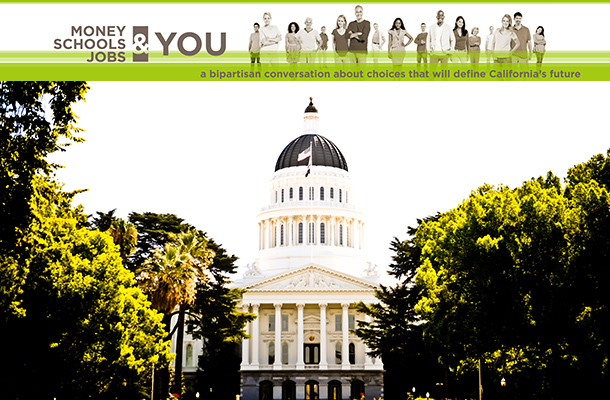
At California Forward, we are constantly asking ourselves what needs to be done next to improve California’s governance and restore California’s role as the model for other states and nations to follow.
It’s important to first celebrate what has been achieved in the last few years during what we like to call this “era of reform.” Political gridlock has been significantly reduced. In good measure, that’s because of a combination of political reforms advanced by California Forward and other organizations: districts are no longer gerrymandered to be “safe” for uncompromising partisans; the top-two primary makes it harder to blame the other side of the aisle and encourages lawmakers to respond to voters in the middle; and term limit reform is causing legislators to start to build the relationships and develop the expertise they need to be successful during a potential 12-year run in the same job.
We are seeing results! A few examples: state budgets are no longer chronically late; a rainy day fund to help manage revenue volatility is law; Enhanced Infrastructure Financing Districts (EIFDs) were created by the legislature to help finance local infrastructure; a water bond was passed to begin to address long-delayed improvements to how we manage that precious resource.
But much more needs to be done at all levels of government.
California Forward has held multiple regional convenings to get input from civic and political leaders on what the next steps should be. We also convened a group of four bi-partisan leaders for in-depth conversations on the subject – Fresno Mayor Ashley Swearengin (R), former San Jose Mayor Chuck Reed (D), Davenport Institute Director and recent candidate for Secretary of State Pete Peterson (R), and Educator in Residence at the New Teacher Center and recent candidate for Superintendent of Instruction Marshall Tuck (D).
The discussions were so thoughtful and constructive that we encouraged them to continue their conversations in front of public audiences. The first of these will be held in San Jose on August 19. A second is slated for Clovis on September 29. Others will be scheduled across California this year and next.
A conversation about the choices voters and elected leaders must make to create a better future for California is an ambitious agenda for a two-hour meeting. The four bipartisan leaders have chosen to focus the first round of public conversation on four key topics: money, education, jobs and public engagement. But in the small group conversations that gave birth to these planned public conversations, there were some themes that surfaced regarding virtually all topics discussed. Here’s what we have heard so far:
One sentiment voiced repeatedly is that environmental leadership, economic vitality and social progress must be advanced concurrently. When any one of the legs of this three-legged stool gets too far out in front, the other two legs suffer. The best social program is a job. Education and infrastructure are prime variables for economic vitality. Environmental leadership is part of California’s brand.
Fiscal sustainability must be at the core of everything we do. Fast-rising costs and slow-growing revenues adversely impact basic services. Government at all levels must assertively seek to grow revenue by growing economic vitality; proactively work to limit and reduce debt and unfunded liabilities; and communicate the nexus between fiscal condition and levels of service. Financial reporting must present a complete and understandable picture of fiscal health.
We must do a better job of measuring performance and holding ourselves accountable for outcomes. Government at all levels must create a culture for continuous improvement, incorporating what is learned internally and from others, and publicly report outcomes. Better, simpler, more accessible communication tools are needed to help voters hold their elected leaders accountable.
We must re-engage the public in the civic/political process. Much of the public has become cynical about government. This must change. Particularly on tough issues, public involvement is vital to sustainable decisions. And transparency is key to public engagement. Governments should see part of their task as “educator,” helping the public understand – in plain language — the key decisions of government and their impacts. Proposed state laws should be in print for a minimum of three days before they are adopted. Local governments should post agendas and background materials ten days before meetings instead of the required three days, and proposed actions on major issues, such as annual budgets and collective bargaining agreements should be made public long before they are adopted.
It was refreshing and inspiring to listen to the thoughtful conversations among these four bipartisan leaders, and encouraging to see them find common ground on so many important topics and policy principles. Now the public will have an opportunity to participate in these conversations. We hope you can attend. For information on date and location of these forums, go to CA Fwd’s Events page.
Pete Weber is Co-Chair California Forward and former Executive Committee Chair of the California Partnership for the San Joaquin Valley.

